

Pain is simply part of life. I think THAT much is clear as we are almost two weeks into 2023 *thinks of carbs and cries* Truth is, we have little control over most of what happens to us. This is true in life and in publishing. Control, in many respects, is an illusion. We can only do our little part on most things then hope and pray for the best.
This might sound a lot like me being a Debbie Downer here, but the truth can actually be quite liberating. When we recognize there is only SO much we can control, it narrows down our focus and all the things we “care” about.
We can set expectations accordingly and realize what is within our purview (finished books sell WAY better than unfinished ones) and frankly, what’s totally out of our hands (novels featuring left-handed snake handlers are all the rage!).
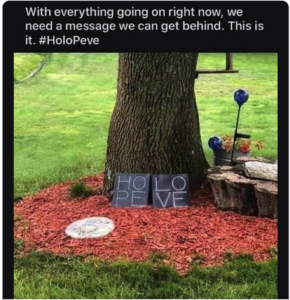

Dealing with Change
Publishing, like every other industry on the planet, has experienced a drastic transition over the past 12 years or so. An industry that had remained relatively untouched for over a century crumbled. Whether we like it or not, Amazon and on-line shopping dismantled an institution.
And yes, I hear all the writers collectively groan and wail. I don’t like it either. Shopping on-line just isn’t the same as browsing a bookstore all day, feeling paper in your hands and having a physical thing, right away you can touch and read and (if you are me) scribble in.
If you do want to set out to write professionally, then it is wise to understand exactly what you’re getting into. The actual path to publishing, not the “Made for TV” version we can be way too fond of (especially when new).
Writers are entrepreneurs and entrepreneurs are wise to do what is called a S.W.O.T. Analysis (Strengths, Weaknesses, Opportunities, Threats).
So the “bad” news first.
Pain and Publishing


The consignment model that bookstores have relied upon for well over a century is, for all intents and purposes, gone. For anyone curious how this model worked (and is now likely limping along) the The Hard Truth About Publishing—What Writers & Readers NEED to Know provides a detailed breakdown.
Regardless, publishing will continue to go more and more on-line for a number of reasons. The consignment model, as I’ve pointed out, is and always has been grossly inefficient. This was all well and good so long as bookstores and physical books had no competition, no cheaper alternative. But that is no longer the case.
Additionally, want to know something about paper? It is freaking HEAVY, which means, with the cost of diesel right now, the profit from any paper book is tied to the cost of crude.
If it costs a small fortune to ship books, that eats away at any profit. Eventually, there is a ceiling that even bibliophiles will reach. We’ll only pay SO MUCH for the paper books we love, especially when digital is a fraction of the cost.
All this to say that Ye Olden Days of Publishing are gone, and have been for a while. Which is fine, but also scary. In the August 2, 2022 article in The New York Times, The Books Merger That’s About Amazon:
The elephant in the room is Amazon. Book publishers want to become bigger and stronger partly to have more leverage over Amazon, by far the largest seller of books in the United States. One version of Penguin Random House’s strategy boils down to this: Our book publishing monopoly is the best defense against Amazon’s book selling monopoly.
Shira Ovid, The New York Times
Whether for good or for ill, a judge blocked NY publishing’s plans to merge two publishing titans—Penguin Random House and Simon & Schuster—in hopes of faring better against their ongoing nemesis, Amazon.
Initially, the duo claimed they’d fight this decision, but have since withdrawn any future plans to merge.
It’s Just Business
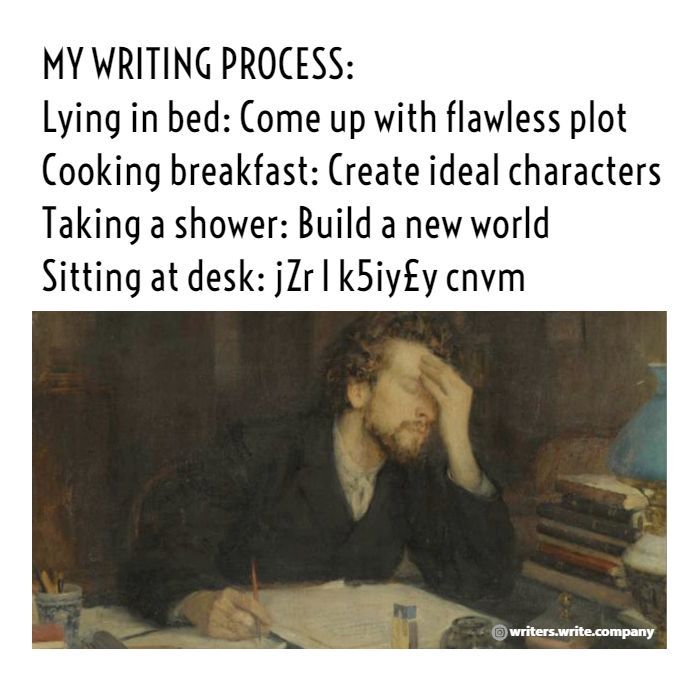

In the face of a recession that’s steadily nibbling away at profits as well as supply chain issues, the future of publishing is, as always, uncertain. This has always been the case in traditional publishing (especially when an excruciatingly small minority of authors are responsible for most of the profit).
This said, publishing is a business. Writing, if we want to go pro, is a business. We are wise to understand that business and how it works (or doesn’t). I totally get you and wish I had different news. What I would GIVE if all I had to do was WRITE. But, when we go pro, there’s a lot more that goes into being an author than simply getting words on the page.
And enough about that.
My goal here isn’t to utterly deflate anyone’s dreams of becoming a successful author, but this is a voyage. Like any voyage, it’s simply prudent to be honest about the trip ahead and plan accordingly the best one can.
It’s Looking Up…Maybe
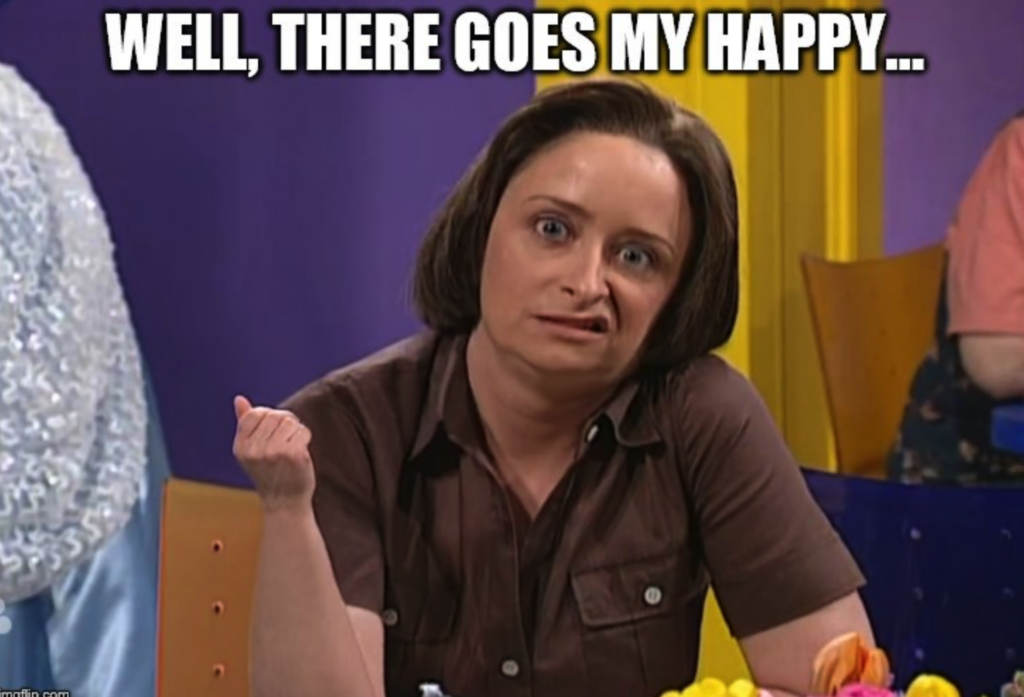

One good “trend” I am seeing is the resurgence of older titles. In a November 1, 2022 article in The New York Times, A Big Publishing Merger Was Blocked, but Brought the Industry Little Clarity:
Simon & Schuster, however, has been having a very strong year, outperforming many of its rivals. Its revenue grew by 34 percent in the second quarter of the year, driven in large part by older books that have taken off on TikTok, including “It Ends With Us,” by Colleen Hoover. “The Last Thing He Told Me,” a novel by Laura Dave, spent a year on the best-seller list and has now sold two million copies, Simon & Schuster said. Ada Ferrer’s “Cuba: An American History” won a Pulitzer Prize.
Elizabeth A. Harris & Alexandra Alter The new York Times
What do I see in this? Readers are tired of the slush pile being dumped in their laps. I’ve always held issue with how the big publishers and major retailers like B&N conducted business, namely because they kept trying to out-Amazon Amazon instead of playing to THEIR strengths.
Big publishing’s largest strength has ALWAYS been the relative quality of their books (overall). Even the worst traditionally published book generally has a cohesive plot and isn’t riddled with typos. When readers are thrust into a market saturated with unreadable, unedited or poorly edited stories, traditional publishers have always had the advantage.
Ironically, the entity they fought tooth and nail (social media) is the main component that now seems to be saving them.
What Does This Mean?
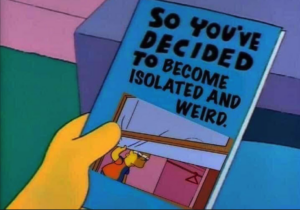

It means, firstly, that there are two fundamental aspects to being successful as an author—> Good books and solid platform.
I think we are, blessedly, moving beyond the early fascination with the shiny widgets and we (readers) want quality reads. We also don’t have a lot of time, and resent wading through bad books, regardless how they’re published.
People will always want good stories (Fiction) and information (NF).
The fact that older, pre-digital age books are coming back big, is a sign to me that we have more readers than ever, and they’re enthusiastic about excellent stories. Not only enthusiastic, but also addicted to social media, so they will InstaTwitFace all day about what they love!
We’re also seeing an explosion of different KINDS of stories, thus creating opportunities for different kinds of WRITERS. Short works are making a BIG comeback. The digital age has resurrected many forms of writing that were almost lost to us (E.g. poetry, essays, novellas, short stories, serials, etc.)
I’ve published traditionally, indie, and self-pub. Since I’m a control freak who enjoys breaking rules, I prefer self-pub and agree with Stephen Haunts that we indies really are The Punk Rock of Publishing.
So more good news. We are no longer in a One-Size-Fits-All profession. Yes, we’ll have to choose our pain, but at least now we have more options for our publishing suffering.
To the Pain
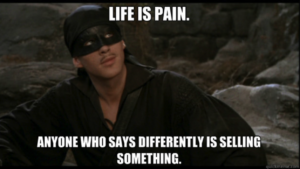

For those of us who want go pro, it is time to get to WORK. I love NaNoWriMo as much as anyone. I’ve been doing it for years and most of the projects I’ve completed are now published works.
Yet, when we make the shift from hobbyist to professional, every month is NaNoWriMo.
We have to understand that, while there is nothing wrong with writing for fun, hobbyists play for fun. Pros play for keeps. Make a habit of writing every day. I don’t care if it is 500 words (2 pages). Two pages every day of every week soon becomes a book.
As Mark Manson reiterates in his best-selling book The Subtle Art of Not Giving a F**k, it is easy to fall in love with the end result. To imagine our books on every end cap, in People Magazine, trending on TikTok, or being made into a Netflix Original. And those are the dreams that will keep us going through the giant span of SUCK before the breakthrough.
Yet, in the meantime…
What KIND of Pain Will You Enjoy?
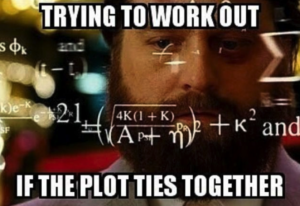

What kind of PAIN will we enjoy most? Because we cannot truly control anything in the industry beyond a certain point. To go pro, we must be honest about the pain writing entails then ask if it is worth it.
Would you STILL write even if I told you you’d never make a dime and likely die in obscurity? If the answer is yes, then we’re off to the races. If we write because we love it and wish to master it, then that is all that truly matters.
That passion will make us show up day after day and turn out word count. We’ll become experts at FINISHING. No half-perfect novel ever became a runaway success, but a lot of completed “crappy” books have.
We will have to keep an eye on the industry, understand how it works. If one publishes traditionally, then there is the pain of whatever limitations/expectations a publisher might place on us.
If we publish non-traditionally, then we not only need a good book, but we have to oversee the blurbs, back copy, formatting for paper and e-book, cover design, ISBNs, marketing, platform, brand, etc.
Which, for the record, ALL authors are responsible for marketing, platform and brand so there’s no Publishing Sugar Daddy that is going to shield us from that.
Peace with Pain
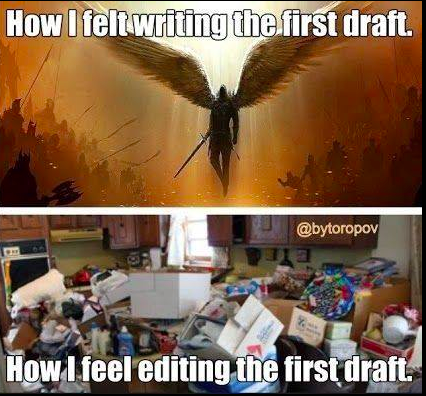

When we are okay with the pain of working alone, dealing with setbacks, learning to stick and move with an industry that changes at the speed of algorithms, and we’re willing to do the hard stuff because we love to write THAT MUCH?
Going pro is probably a good decision.
The better news is we’ll have lasting power our peers don’t possess. Believe it or not, most of being successful in anything is the discipline to consistently show up.
Every legendary book was written one word at a time.
Writing as a hobby is ALWAYS a good decision for those who have a passion for story. We don’t HAVE to monetize everything that brings us joy! It is OKAY to simply have fun.
Remember this when looking back at those New Year’s Resolutions still freshly inked on the page. If we fall in love with process, we can accomplish almost anything.
What are Your Thoughts About Pain?
Other than you don’t like it? Same. What I would GIVE for a pain-free option, but sadly life doesn’t work that way. Do you love the process or just love to fantasize about the end victories?
Hey, I was TOTALLY guilty when I was new. I spent more time imagining my books a movies than actually writing. Now? I am guilty of the opposite and need to do more dreaming.
It is 2023, so what have you decided? Go pro? REALLY? Or just learn to enjoy dabbling? Maybe a mixture of both? Do you need to be stricter with yourself, or maybe learn to lighten up a little?
I LOVE hearing from you!
